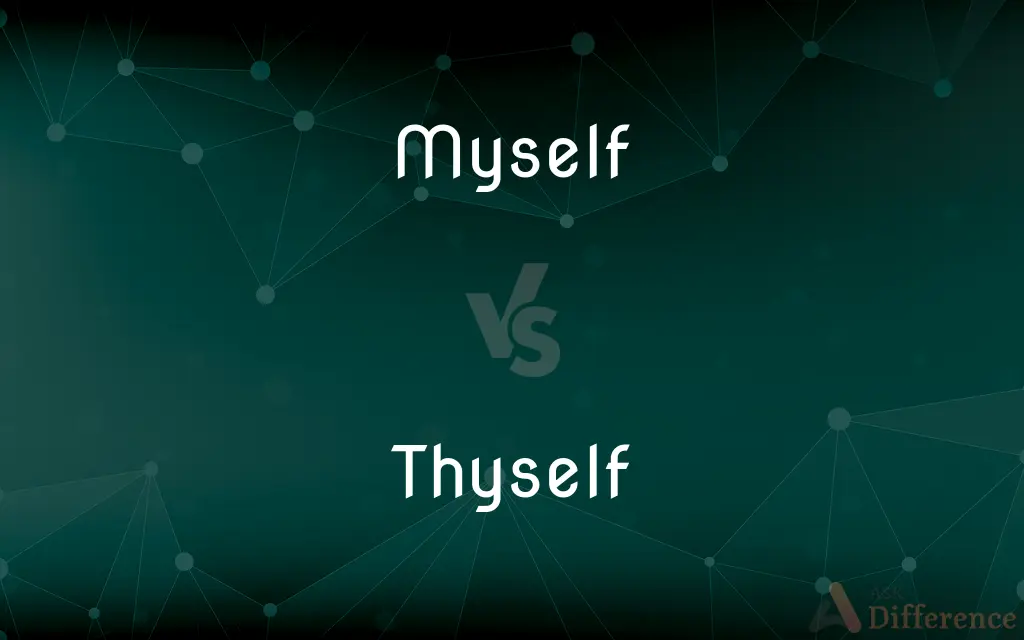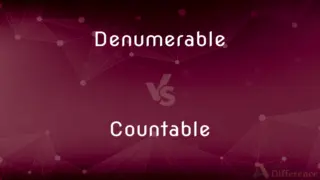Myself vs. Thyself — What's the Difference?
By Tayyaba Rehman — Updated on November 7, 2023
Myself is the reflexive form of "I," providing emphasis or acting as the object referring back to the speaker, while thyself is the archaic equivalent for "thou," addressing the listener.

Difference Between Myself and Thyself
Table of Contents
ADVERTISEMENT
Key Differences
"Myself" is a reflexive pronoun in modern English, directly related to the first-person singular pronoun "I." It is used when the subject of the sentence is also the object, or to add emphasis to a statement that involves the speaker. "Myself" serves the purpose of highlighting the actions or emotions of the speaker, ensuring that the focus is on them.
On the other hand, "thyself" is the reflexive form of the second-person singular pronoun "thou," which is now considered archaic. "Thou" and its forms were used for addressing a person in a familiar way or in a religious or poetic context, and "thyself" followed suit as its reflexive counterpart. Where "myself" focuses on the speaker, "thyself" was directed at the person being spoken to, yet in a manner that is seldom used in contemporary English.
Both "myself" and "thyself" serve a reflexive function, referring back to the subject of the sentence. However, while "myself" is widely used and recognized in today's English, "thyself" is typically encountered in historical texts, religious contexts, or literary works that aim to mimic an older style of English. The use of "myself" is personal and immediate, while "thyself" now carries with it an air of formality and antiquity.
In the structure of modern English, "myself" is commonly used and understood by speakers across various contexts, serving both reflexive and emphatic roles in sentences. Conversely, "thyself" has mostly fallen out of everyday use, and its inclusion in modern dialogue can signal a deliberate stylistic choice, often to invoke an older or more solemn tone.
Comparison Chart
Pronoun Type
Reflexive pronoun for "I".
Reflexive pronoun for "thou".
ADVERTISEMENT
Usage
Common in modern English.
Archaic, rarely used today.
Function
Refers back to the speaker.
Refers back to the second person.
Context
Personal, introspective.
Historical, religious, or poetic.
Example
"I did the task myself."
"Know thyself."
Compare with Definitions
Myself
As an intensive pronoun
I made the cake myself.
Thyself
As a reflexive pronoun
Prepare thyself for the journey.
Myself
To stress identity
I am myself and no one else.
Thyself
As an intensive pronoun
Thou hast redeemed thyself.
Myself
For self-reference
Talking to myself helps me think.
Thyself
To stress identity
Be thyself in all occasions.
Myself
Used by a speaker to refer to himself or herself as the object of a verb or preposition when he or she is the subject of the clause
I strolled around, muttering to myself
I hurt myself by accident
Thyself
For emphasis
Thou must thyself be the change.
Myself
I or me personally (used to emphasize the speaker)
I myself am unsure how this problem should be handled
I wrote it myself
Thyself
For self-reference
Know thyself and thy virtues.
Myself
Used by a speaker to refer to himself or herself; I
Myself presented to him a bronze sword
Thyself
Yourself as the object of a verb or preposition or as an intensifier; reflexive case of thou
Thou hast only thyself to blame.
Thou thyself art to blame.
Physician, heal thyself.
Myself
(reflexive pronoun) Me, as direct or indirect object the speaker as the object of a verb or preposition, when the speaker is also the subject.
I taught myself.
Thyself
An emphasized form of the personal pronoun of the second person; - used as a subject commonly with thou; as, thou thyself shalt go; that is, thou shalt go, and no other. It is sometimes used, especially in the predicate, without thou, and in the nominative as well as in the objective case.
Thyself shalt see the act.
Ere I do thee, thou to thyself wast cruel.
Myself
Personally, for my part; used in apposition to I, sometimes for simple emphasis and sometimes with implicit exclusion of any others performing the activity described.
Myself
In my normal state of body or mind.
Myself
Me (as the object of a verb or preposition).
I feel like myself.
Myself
(archaic) I (as the subject of a verb).
Myself
My name is...
Myself John.
Myself
I or me in person; - used for emphasis, my own self or person; as I myself will do it; I have done it myself; - used also instead of me, as the object of the first person of a reflexive verb, without emphasis; as, I will defend myself.
Myself
As a reflexive pronoun
I completed the project myself.
Myself
For emphasis
I myself was unsure of the decision.
Common Curiosities
When do I use "myself"?
Use "myself" when you are both the subject and the object of a sentence, or for emphasis.
Can "myself" start a sentence?
It is uncommon and typically not advised to start a sentence with "myself."
Can I use "myself" to refer to someone else?
No, "myself" only refers to the speaker.
Can "thyself" be used in modern English?
While grammatically correct, "thyself" is archaic and not commonly used in modern English.
Is "thyself" ever used for emphasis?
Historically, "thyself" was used for emphasis, but it is not common in modern English.
When is "thyself" appropriate to use?
"Thyself" is archaic and rarely used, suitable in historical or religious contexts.
How can "myself" be used for emphasis?
Use "myself" for emphasis after the subject, as in "I myself don’t agree."
What pronoun has replaced "thyself" in modern English?
"Yourself" is the modern equivalent of "thyself."
Does "thyself" follow the same reflexive rules as "myself"?
Yes, "thyself" was a reflexive pronoun, but for the second person singular.
Why is "thyself" considered outdated?
"Thyself" fell out of common use with the decline of "thou" in modern English.
Are there any modern replacements for "thyself"?
"Yourself" is the modern equivalent of "thyself."
Is "myself" singular or plural?
"Myself" is singular, referring to the person speaking.
Can "thyself" be used in formal writing?
"Thyself" can be used in works that aim for a historical or biblical tone.
What is the number for "thyself"?
"Thyself" is singular, as it refers to one person being addressed.
Can "thyself" be plural?
No, "thyself" is strictly singular; "yourselves" is the plural form.
Share Your Discovery

Previous Comparison
Denumerable vs. Countable
Next Comparison
Firework vs. FirecrackerAuthor Spotlight
Written by
Tayyaba RehmanTayyaba Rehman is a distinguished writer, currently serving as a primary contributor to askdifference.com. As a researcher in semantics and etymology, Tayyaba's passion for the complexity of languages and their distinctions has found a perfect home on the platform. Tayyaba delves into the intricacies of language, distinguishing between commonly confused words and phrases, thereby providing clarity for readers worldwide.














































